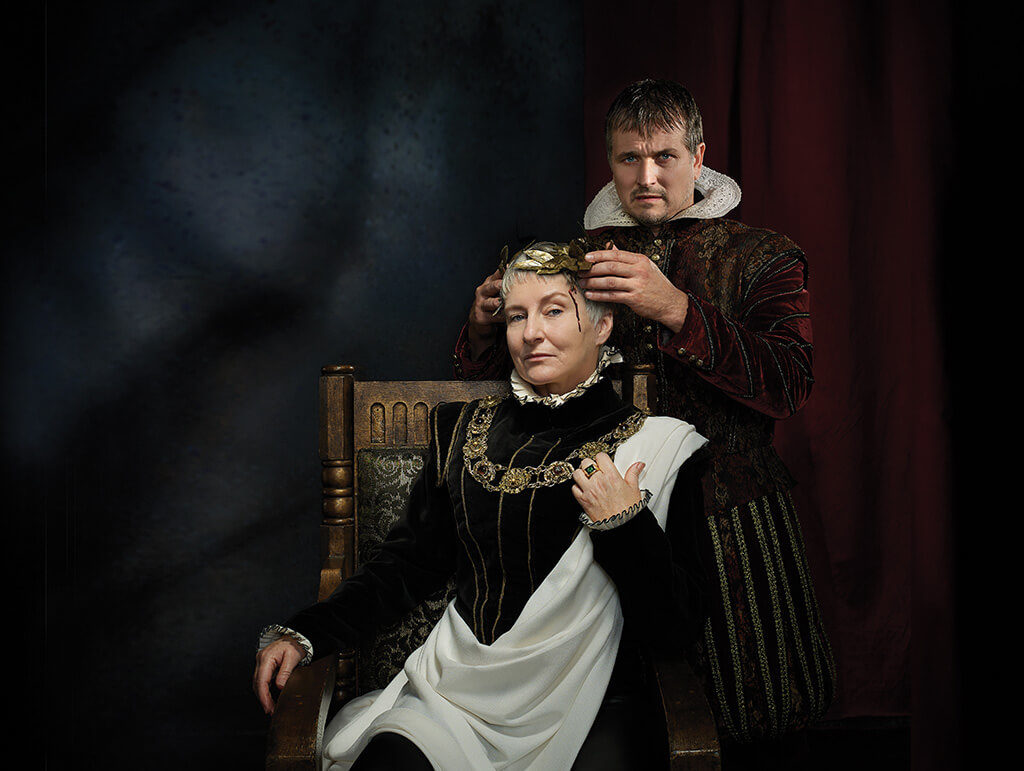Seana McKenna shines as Julius Caesar at Stratford

STRATFORD, ONT. — By the time the assassination scene arrives in the Stratford Festival’s new production of Julius Caesar, the sense of foreboding is palpable.
It’s not just the soothsayer’s urgent warnings to “beware the Ides of March” or the fearful nightmares of Caesar’s wife who pleads with him to remain at home and not go to the Senate on this fateful day. It’s also the noirish atmosphere that shrouds Scott Wentworth’s production in its early scenes.
This is a dark place in which dark plots can happen. Sunlight is banished as Cassius, Brutus and their fellow conspirators plot Caesar’s assassination. Gloom and dankness prevail. Candle light flickers ominously behind the mysterious latticework of designer Christina Poddubiuk’s spare but compelling settings. And lighting designer Louise Guinand is at her best when giving us a world of shadows.
What kind of agencies are really at work here? As the evening progresses, they continue to go beyond the human when we are treated to one startling apparition. The supernatural hovers. Yet at the same time, Wentworth’s production remains attentive to the hard political realities laid out by Shakespeare about the nature of tyranny and the unforeseen consequences of rebellion.
There is the growing sense in the opening half of the play that a necessary ritual is in progress — that Caesar, so covetous of the Imperial Crown that he forgets that he is a mere mortal, must be brought down in order to save Rome from tyranny. Actress Seana McKenna exudes a quiet, but watchful authority in this role. But her Caesar is vain enough to succumb to flattery, embrace her own legend and believe in her own invincibility. It isn’t a showy performance but it’s one that reaches into the very marrow of Caesar’s being.
The assassination scene is brilliantly staged — emerging in this production not just as a ritual sacrifice but almost as a sacramental act. And it makes for thrilling but also thought-provoking theatre.
Still, the danger with many productions of Julius Caesar is that, once we’re done with Caesar’s murder and Marc Antony’s funeral oration, the remainder of the play can seem an anti-climax as we see Rome erupt into civil war and his killers begin toppling like ninepins. In the case of the current Stratford revival, however, the play begins sagging as soon as the uncharismatic Antony of Michelle Giroux begins his funeral oration.
The speech is dismayingly unpersuasive — stripped of the underlying sophistry, cunning and cold psychological manipulation that has made it the most famous oration in literature. And the response of the rabble, which should be driven to frenzy by what it’s hearing, is distinctly undernourished.
Shakespeare’s history plays repeatedly reflect a fear of disorder — moral, spiritual and political — and in Julius Caesar, his main concern is not with the murdered Caesar but with those responsible for his death and the destructive aftermath of their actions. Bernard Shaw once called the play “the most splendidly written political melodrama we possess.”
Yet at Stratford this summer, we’re not particularly engaged by what happens in the second half. Only Jonathan Goad’s conflicted, self-doubting and increasingly haunted Brutus engages our attention — and even this performance at times seems curiously distanced from the character.
We’re not experiencing ancient Rome in this production, so togas are out, Instead there’s a vaguely Jacobean setting, meaning that there are a lot of puffed sleeves and puffed britches on view. As a result, characters are not always well-served by their attire. There’s no way that a splendid Irene Poole, icily convincing in the role of the jealous Cassius, can communicate the “lean and hungry look” attributed to her by Caesar.
The production is notable for its gender-bending casting. How well does it work? In the case of McKenna’s confident Caesar, the question seems irrelevant. But what are we to make of the murder of Cinna who’s virtually torn apart by the mob? It’s one of the most horrifying moments in the Shakespeare canon — but here the perpetrators seem to be all women. Are we supposed to see them simply members of the rabble? Or on this occasion are we supposed to see them as female — and if so, what is the production trying to say? Sometimes the festival’s devotion to gender-neutral casting can lead us down bewildering paths.
(Julius Caesar continues at Stratford’s Festival Theatre until Oct, 27. Ticket information at stratfordfestival.ca or 1 800 567 1600)